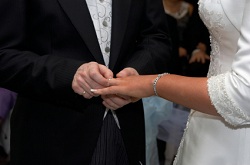 A valid marriage in Michigan constitutes a man and woman who are capable of giving consent and consent is obtained freely, have a marriage license and the marriage must be solemnized by an authorized person in the State of Michigan.
A valid marriage in Michigan constitutes a man and woman who are capable of giving consent and consent is obtained freely, have a marriage license and the marriage must be solemnized by an authorized person in the State of Michigan.
A judge of the district court, a district court magistrate, a municipal judge, a judge of probate, a federal court judge, the mayor of a city, the county clerk of a county with more than 2 million residents, a minister of the gospel and non-resident ministers of the gospel who is valid to procure a marriage elsewhere in Michigan state, may all solemnize a marriage in the State of Michigan. You must have two witnesses, not including the officiate, at your wedding. There is a special law that allows the “people called friends or Quakers†and “people of any other particular denomination having, as such, any peculiar mode of solemnizing marriages†to solemnize their marriages in their own manner. The officiate of the marriage must return a ‘duplicate marked’ copy of the license to the married couple and submit the original to the clerk that issued it within 10 days of the marriage ceremony.
You do not need to be a resident of the State of Michigan to apply for a marriage license in the state, however there is a three day waiting period to obtain a marriage license. The three day waiting period can be waived by the county clerk for ‘good and sufficient cause shown’. There is a basic $20 fee for residents and $30 for non-residents of Michigan to obtain a marriage license. The license is valid for 30 days.
No one under the age of 15 shall be married unless they have parental consent and probate court permission. Applicants 16-years-old must have parental consent.
Michigan does not recognize common law marriages, even those that are valid in other states. Michigan also does not allow Covenant marriages, same-sex marriages, cousin marriages or proxy marriages.















wow
this is horrible you should get married at any age if you want!
^agreeed
60% of our state.might b hoods… but we got one thing
Right
hey im 15 going on 16 and i have a baby on the way and im alredy settled down im engaged i love her deeply thick and thin but i feal that 15 and up should be allowed with out the stupid parents consent!!!!
Agreed… Age shouldn’t matter! It’s our own Lives!!!
You guys do realize that a marriage is a legal contract, right? You don’t let minors sign other legal contracts (such as leases or for loans) at all or without parental consent. Marriage licenses work the exact same way.